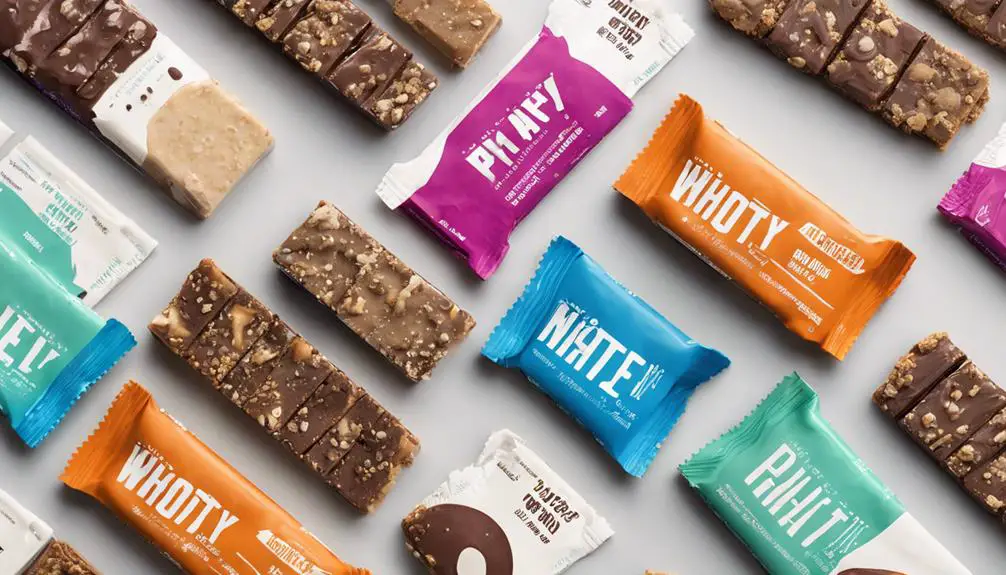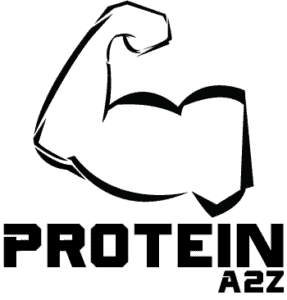Yearning for protein bars? Discover the answer to how many you can safely consume daily before facing potential health
If you're contemplating how many protein bars a day are too many, keep in mind that excessive consumption can lead to various health concerns such as digestive issues and nutrient imbalances. It's crucial to be mindful of the number of protein bars you consume daily to avoid potential adverse effects on your health.
Table of Contents
Key Takeaways
- Consuming more than 1-2 protein bars a day can lead to excessive caloric intake.
- Too many protein bars can cause nutrient imbalances and potential deficiencies.
- Overconsumption may result in gastrointestinal distress like bloating and gas.
- Limit protein bars to avoid disrupting gut bacteria balance and digestion.
- Moderation is crucial to prevent unhealthy weight gain and imbalanced nutrient intake.
Risks of Excessive Protein Bar Consumption

Consuming excessive protein bars can lead to various risks, including gastrointestinal distress, unhealthy weight gain, and nutrient imbalances.
Protein bars, often marketed as convenient snacks or meal replacements, can contain high levels of fiber and sugar alcohols. These components, while beneficial in moderation, can lead to digestive issues such as bloating, gas, and diarrhea when consumed excessively. Additionally, the calorie content of protein bars, if not taken into account in your overall diet, can contribute to weight gain over time.
Moreover, nutrient imbalances may arise from relying heavily on protein bars for sustenance. Unlike whole foods, protein bars lack the diverse array of vitamins, minerals, and antioxidants necessary for excellent health. Prolonged consumption of protein bars without a varied diet can result in deficiencies that may impact overall well-being. Hence, it's important to be mindful of your protein bar intake and make sure they complement, rather than replace, a balanced diet for excellent health and nutrition.
Impact on Digestive Health
Consuming an excessive amount of protein bars can result in digestive problems such as bloating, gas, and diarrhea due to their high fiber and sugar alcohol content.
This increased consumption can disturb your gut health, leading to discomfort and irregular bowel movements.
Monitoring your protein bar intake is crucial to avoid digestive distress and sustain a healthy gut microbiome.
Digestive Issues From Overconsumption
Excessive consumption of protein bars may lead to digestive discomfort, including bloating, gas, and diarrhea. This can be attributed to various factors such as the high intake of sugar alcohols often found in protein bars.
Sugar alcohols like sorbitol, mannitol, and xylitol are known to cause gastrointestinal distress when consumed in excess. Additionally, the disruption of the gut bacteria balance due to overconsumption of protein bars can further exacerbate digestive issues.
Furthermore, some protein bars contain high fiber content, which, when consumed excessively, can result in problems like constipation. To maintain essential digestive health, it's important to moderate the intake of protein bars and be mindful of the ingredients, especially sugar alcohols, to prevent such digestive discomfort.
Gut Health Implications
Overindulging in protein bars rich in fiber and sugar alcohols can disrupt the balance of gut bacteria, potentially leading to digestive complications. When it comes to gut health implications, excessive intake of protein bars can trigger digestive issues such as bloating, gas, and diarrhea. It's essential to monitor your tolerance levels and adjust your protein bar consumption accordingly to avoid stomach cramps and discomfort. Maintaining a balanced intake and practicing moderation are vital to prevent adverse effects on your digestive health from consuming too many protein bars. Remember, listening to your body and being mindful of how many protein bars you consume can help you support your gut health in the long run.
| Protein Bars | Digestive Issues |
|---|---|
| High in fiber | Bloating |
| Sugar alcohols | Gas |
| Excessive intake | Diarrhea |
Potential for Unhealthy Weight Gain

Protein bars, when consumed without moderation, can pose a risk of unhealthy weight gain due to their high calorie content. Excessive intake of protein bars, which are calorie-dense, may contribute to weight gain over time.
These bars are designed to supplement protein needs, but if consumed in excess of daily requirements, they can lead to an increase in calorie intake, potentially resulting in unhealthy weight gain. It's vital to be mindful of portion sizes and not rely solely on protein bars for nutrition, as their high-calorie content can easily tip the balance towards weight gain when overindulged.
To maintain a healthy diet and weight, it's crucial to view protein bars as part of a well-rounded eating plan rather than a primary source of nutrition. By being aware of the calorie content and moderating intake, you can enjoy protein bars as a beneficial supplement without the risk of unwanted weight gain.
Risk of Nutrient Imbalance
Consuming too many protein bars may put you at risk of nutrient imbalances since these bars often lack the diverse array of nutrients found in whole foods. By relying heavily on protein bars, you might miss out on essential vitamins, minerals, and fiber important for overall health.
It's essential to guarantee a well-rounded diet that includes a variety of nutrient-dense foods to avoid potential nutrient deficiencies associated with excessive protein bar consumption.
Nutrient Absorption Concerns
To maintain essential nutrient absorption and prevent imbalances, it is important to diversify your food sources beyond relying heavily on protein bars. While protein bars can be convenient, consuming them excessively may lead to nutrient absorption concerns due to their potential lack of essential nutrients found in whole foods. Overreliance on these bars can result in deficiencies in important vitamins, minerals, and other significant nutrients, disrupting the body's ability to absorb nutrients properly. It is essential to ensure a varied diet to meet all necessary nutrient needs. Below is a table highlighting some key differences between protein bars and whole foods:
| Aspect | Protein Bars | Whole Foods |
|---|---|---|
| Nutrient Variety | Limited range of nutrients | Wide array of nutrients |
| Fiber Content | Low | High |
| Processing Level | Highly processed | Minimally processed |
| Antioxidants | Often lacking | Abundant |
Potential Health Implications
Excessive reliance on protein bars may pose risks of nutrient imbalances due to their limited nutrient variety compared to whole foods. While protein bars can be convenient as a meal replacement or snack, consuming them excessively can lead to a lack of essential vitamins, minerals, and other nutrients vital for your overall health.
These bars may not offer the same diverse range of nutrients found in whole foods, potentially causing deficiencies with excessive consumption. Depending too heavily on protein bars may also displace the variety of nutrients obtained from a balanced diet.
To maintain peak health, it's essential to moderate protein bar intake and complement them with a diverse selection of whole foods to make sure you meet your nutritional needs effectively.
Recommended Daily Protein Bar Intake

For essential nutrition, consider consuming protein bars in moderation, typically ranging from 1 to 2 bars per day. Your daily protein bar intake should be adjusted based on your overall diet and activity level.
Consuming more than 2 bars a day may lead to excessive calorie and nutrient intake, potentially causing weight gain and nutrient imbalances. It's vital to space out your protein bar consumption throughout the day to prevent overconsumption.
Balancing your protein bar intake with other whole foods is essential for meeting your nutritional needs without exceeding daily calorie requirements. Keep in mind that protein bars are convenient snacks but shouldn't replace balanced meals.
Effects of Excessive Protein Bars
Consuming an excessive amount of protein bars may lead to various negative effects on your digestive system and overall health. Here are some potential consequences to be aware of:
- Digestive Issues: Excessive consumption of protein bars can result in digestive problems such as bloating, gas, and diarrhea. These symptoms can be uncomfortable and impact your daily routine.
- Weight Gain and Blood Sugar Spikes: Protein bars high in added sugars, when consumed excessively, can contribute to weight gain and lead to spikes in blood sugar levels. This can have implications for overall health and well-being.
- Nutrient Imbalances: Protein bars, while convenient, may lack the variety of nutrients found in whole foods. Consuming too many protein bars could lead to nutrient imbalances, potentially causing deficiencies in essential vitamins and minerals crucial for maintaining good health.
It is important to be mindful of your protein bar intake to avoid these negative outcomes and promote a balanced diet for optimal health.
Benefits of Protein Bars for Muscle Growth

Protein bars offer essential nutrients like protein and calcium, supporting muscle growth and repair. They can aid in protein synthesis, vital for muscle development.
Additionally, protein bars serve as a convenient post-workout snack option to help maintain muscle mass.
Muscle Repair and Growth
To support muscle repair and growth effectively, incorporating protein bars into your diet can be beneficial due to their high protein content. Protein bars provide essential amino acids necessary for muscle repair and growth, aiding in the synthesis of new muscle tissue post-exercise.
Consuming protein bars post-workout helps replenish protein stores, supporting muscle recovery and maintenance. Including protein bars in your diet can assist in maintaining muscle mass and overall muscle health.
Protein Synthesis Support
Maximizing muscle growth potential can be supported by incorporating protein bars into your diet due to their rich source of essential amino acids. Protein bars are designed to aid in protein synthesis support, essential for muscle recovery and development.
These bars are packed with high-quality protein sources such as whey, soy, or plant-based proteins, which are easily absorbed by the body to promote muscle repair. Ensuring adequate protein intake from protein bars can enhance your body's ability to build and maintain muscle mass effectively.
Convenient Post-Workout Snack
For enhanced muscle recovery and growth following your workout, consider incorporating a protein bar as a convenient post-exercise snack option. Protein bars offer essential nutrients that aid in muscle repair and growth. Here's why they make a great post-workout snack:
- Muscle Repair: Protein bars support protein synthesis, important for muscle repair after exercise.
- Energy Replenishment: These bars help replenish energy stores depleted during your workout.
- Optimal Timing: Consuming a protein bar within 30 minutes to 2 hours post-workout maximizes benefits for muscle recovery.
Including protein bars in your post-workout routine can be a convenient and effective way to support your fitness goals.
Protein Bars for Weight Loss

When incorporating protein bars into your weight loss journey, selecting options high in protein and fiber content can significantly support your efforts. Protein bars can assist in weight loss by reducing snacking urges and boosting metabolism. These bars offer a convenient, low-calorie snack choice that helps regulate calorie intake.
By controlling cravings and preventing overeating, protein bars provide a satisfying, nutrient-dense snack option. Choosing bars abundant in protein and fiber can further enhance their weight loss benefits. Integrate protein bars into your balanced diet to contribute to your overall weight management goals effectively.
Protein Bars as a Healthy Snack Option
Protein bars, when selected wisely for their nutritional content, can serve as a beneficial option for healthy snacking. Here's why they can be a good choice:
- Nutritional Benefits: Protein bars offer a convenient way to increase your protein intake, which is essential for muscle repair and growth. They also often contain fiber, which aids in digestion, and are low in sugar, making them a healthier snack option compared to many other alternatives.
- Contribution to a Balanced Diet: While protein bars can be a nutritious snack, it's important to remember that they shouldn't replace whole foods in your diet. They should complement a balanced meal plan that includes a variety of nutrients from fruits, vegetables, whole grains, and lean proteins.
- Amount of Protein: Opt for protein bars that contain at least 20 grams of protein to reap the full benefits of muscle recovery and satiety. Enjoy them between meals or after workouts to keep energy levels stable and cravings at bay. Remember, moderation and variety are key to maintaining a well-rounded diet.
Optimal Timing for Protein Bar Consumption

Consider the most effective times to incorporate protein bars into your daily routine for peak nutrition and performance benefits. One ideal time to consume a protein bar is post-workout, as it aids in muscle repair and recovery. Additionally, having a protein bar between meals can help you feel full and satisfied, preventing overeating. During exercise, snacking on half a protein bar every 40 minutes can maintain your energy levels, making it a convenient option for prolonged physical activities. Additionally, protein bars can serve as a quick energy boost during long workouts, keeping you fueled and focused. Here is a table summarizing the best times to eat protein bars based on grams of protein per serving and the potential energy boost they offer:
| Timing | Grams of Protein Per Serving | Energy Boost |
|---|---|---|
| Post-workout | 20-30 | Muscle Recovery |
| Between Meals | 10-15 | Satiety |
| During Exercise | 5-10 | Sustained Energy |
| Long Workouts | 15-25 | Quick Energy |
| Pre-workout | 5-15 | Performance Support |
Choosing Healthy Protein Bars
To make a wise choice when selecting protein bars, prioritize those that contain natural ingredients and minimal added sugars for better health outcomes. When choosing healthy protein bars, consider the following:
- Essential Ingredients: Opt for protein bars made with essential ingredients like nuts, seeds, whole grains, and fruits. These bars are often minimally processed and provide vital nutrients for your body.
- Low Added Sugars: Select bars with lower added sugar content to avoid unnecessary empty calories. High sugar intake can lead to energy crashes and weight gain, so opting for bars with natural sweeteners like honey or dates is beneficial.
- Key Protein Content: Look for protein bars with at least 20 grams of protein per serving to support muscle repair and growth. Protein is important for overall health and can help keep you feeling full and satisfied between meals.
Plant-Based Vs. Whey Protein Bars

When evaluating plant-based and whey protein bars, it's important to take into account your dietary preferences and nutritional requirements before making a choice.
Plant-based protein bars, derived from sources like peas and brown rice, cater to vegans and those with dairy allergies. They offer added fiber and antioxidants from whole foods, promoting digestive health.
On the other hand, whey protein bars, extracted from dairy, provide essential amino acids important for muscle growth and repair. They're quickly digested, ideal for post-workout muscle synthesis and glycogen replenishment.
Your decision between plant-based and whey protein bars should align with your dietary needs, taste preferences, and tolerance to dairy or plant-based sources. Whether you opt for the complete amino acid profile of whey or the plant-based benefits of added nutrients, both types of protein bars can be part of a balanced diet, supporting your fitness goals and overall well-being.
Frequently Asked Questions
Is 3 Protein Bars a Day Too Much?
Eating 3 protein bars a day can lead to excessive calorie, sugar intake, and nutrient imbalances, potentially causing weight gain and digestive issues. It's generally recommended to limit protein bars to 1-2 daily for balanced nutrition.
Is It Okay to Eat 5 Protein Bars a Day?
Eating 5 protein bars a day isn't advisable as it may lead to excessive calorie intake, imbalanced nutrition, digestive issues, and high sugar levels. For a balanced diet and better health, stick to 1-2 bars daily.
How Many Protein Bars Can I Have in a Day?
You can enjoy up to 2 protein bars a day for most individuals. If you're looking to build muscle, having 3 might be beneficial. Stick to a balanced diet, spacing out your protein bar intake for best results.
What Happens if You Only Eat 1 Protein Bar a Day?
Consuming just one protein bar daily may not offer adequate nutrients, protein, or energy for your body's needs. It's crucial to have a diverse diet with a variety of foods to make sure you meet all your nutritional requirements for excellent health.
Conclusion
To sum up, while protein bars can be a convenient and nutritious snack option, it's important to consume them in moderation. Excessive intake can lead to digestive issues, unhealthy weight gain, and nutrient imbalances.
It's recommended to limit your protein bar intake to 1-2 bars per day and to choose options that are low in added sugars and high in quality protein sources. Remember to prioritize a balanced diet and listen to your body's hunger and fullness cues.

